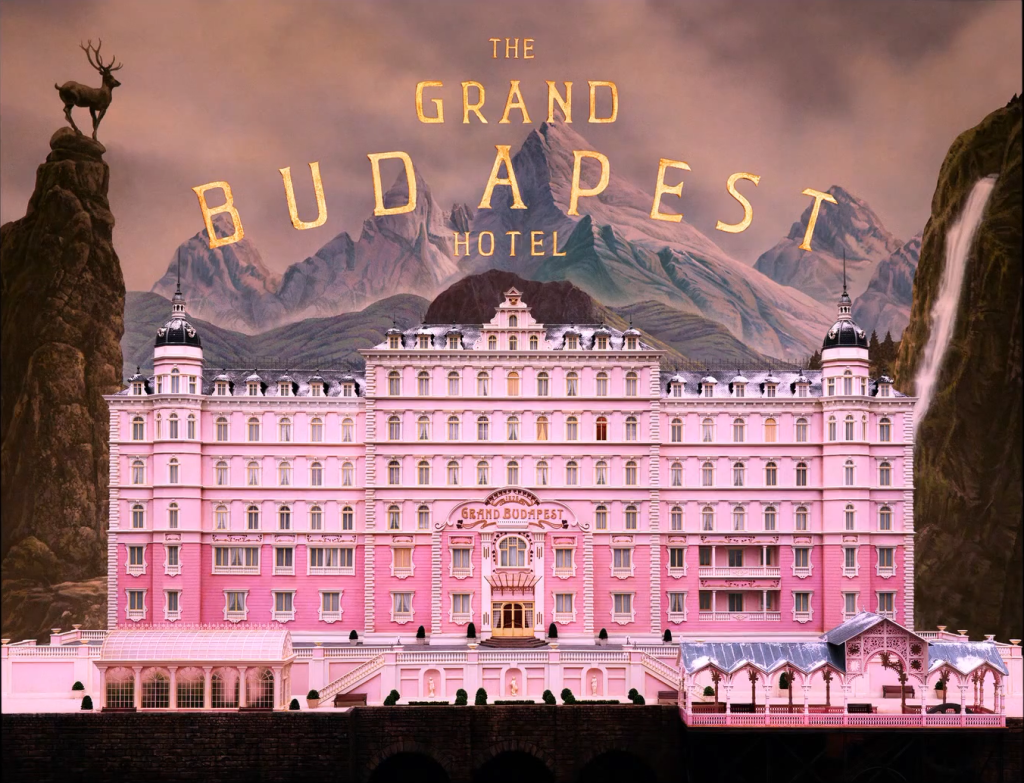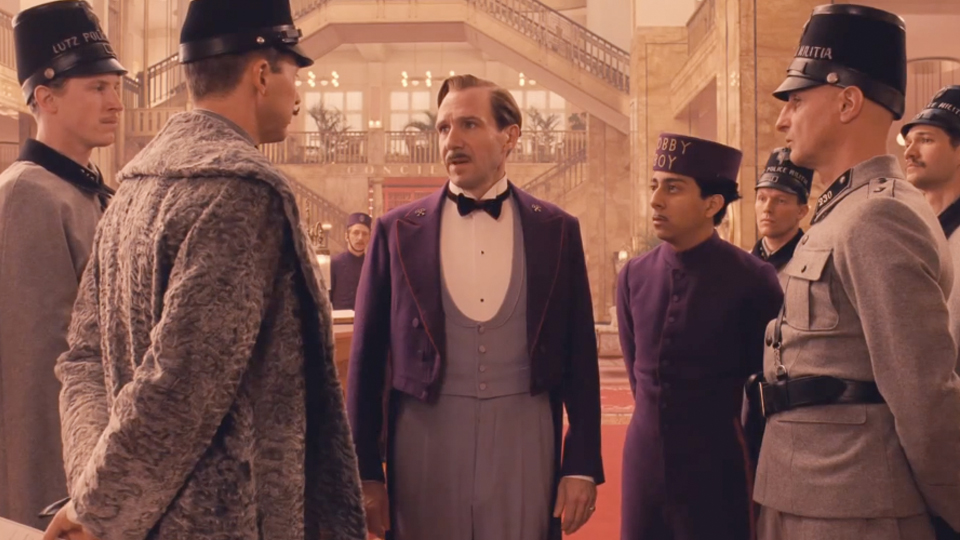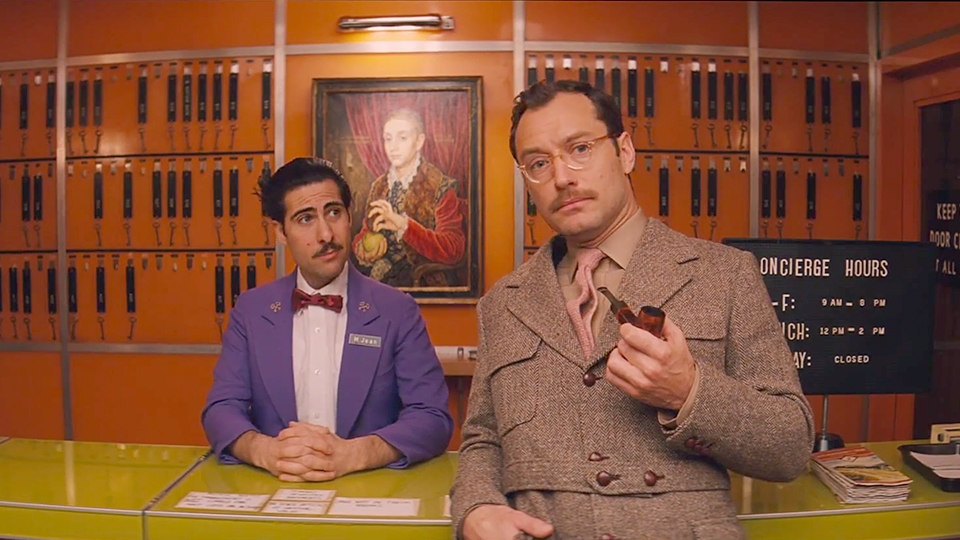by Sawyer Paul
“Nobody’s saying it’s a stroll down the tree line promenade with a fine lady and a white poodle but it’s got what you’d call venerability.”
I’ve read in various reviews for The Grand Budapest Hotel that it confirms everything about writer and director Wes Anderson, and by extension presents nothing to change the minds of people who don’t care for his style. Certainly, there are signature moments of twee precision, of people with more money than us having problems we will never have. I understand the lack of reputability in many of his films, the alien notion that these people aren’t found in any life we know, and that their decisions aren’t ones people here – on this earth – would make. Grand Budapest has these characters, but we find them all on the side of villainy. The hero only wants to help his boss break out of prison to (maybe) sell a stolen painting inherited to him because he slept with an 84-year old murdered woman, and along the way clear his name for her murder which he didn’t (probably) commit, but can’t tell the truth to because it would disrepute some other old woman in another old country.
Okay, the heroes aren’t your next door neighbors. The villains are even less so. The old lady’s son (Adrien Brody) is painted as a Moose-and-Squirrel-hunting cartoon, clad entirely in black with pointed accents and a tiny gun around his ankle. His muscle (Willem Dafoe) scowls with missing teeth, punches with brass-knuckle-style rings on both hands, and shoots with a gun holstered on his chest, next to a flask. The death toll in the film is on him, but he’s a great skiier and I’ve had his theme music on repeat all week.
All right, so maybe The Grand Budapest Hotel is just another Wes Anderson movie, and to make matters worse, part of the recent set where it seems less like a deep character sketch (Rushmore, The Royal Tenenbaums) and more like a frolicking adventure for the kid in all of us (everything he’s done since). This means that the plot is more important than spending time with the cast, and this unfortunately means much of the cast is a blur. The movie ostensibly features nearly two dozen incredible stars, but few reach more than a paragraph in the script. Everyone chews the scenery (and what scenery there is!) but nobody is going to come out of this thinking they saw enough Bill Murray, Owen Wilson (literally 20 seconds of screen time), Tilda Swinton, Jude Law, the aforementioned Brody and Dafoe, or the charming, beautiful, and crafty Agatha, played by Saoirse Ronan.
I even get the sense that we didn’t get enough time with Ralph Fiennes and Tony Revolori, the unlikely pair of buddies in this ostensible buddy caper. This isn’t due to lack of screen time, but instead that Anderson only scratched the surface of their profile. Revolori’s Zero has the back story of a refugee and survivor, but the guile of a man well beyond his years. Fiennes’ M. Gustav H combines dandy sensibilities with a sea of secret society esteem.
But here’s the thing with Anderson’s work since The Life Aquatic: if you let them in, his movies are an immeasurably good time. His work forces you to smile ear-to-ear like no other director, marveling at both the scale of his dioramas and ability to – stone-faced and without irony – tell you that none of it matters. There’s artifice upon artifice, stories about stories about stories, wrapped up neatly in a framing device that reminds us that even the most daring and brilliant adventures will one day be just a way to lazily burn an afternoon. And yet, I still found myself attracted to nearly everyone on screen, invested in their well-being, and hoping for not only the best but more.
Throughout The Grand Budapest Hotel, characters begin reciting poetry. These poems are romantic and profound (if a little pedantic), and invariably interrupted by plot. This happens roughly half a dozen times. The characters want to ruminate on a moment, and have the perfect stanza with which to do so, but there is no time. They are on the run, and their enemies are close. There is a sense that if they don’t hurry, there will never be time for poetry ever again. This is where the movie gets its actual weight: enemies are on the horizon. The edges of the film’s map are already lousy with Nazis (here retrofitted with no-name branding, complete with two Z’s instead of S’s), and they only encroach as the film progresses. But the Nazis aren’t what defeats our heroes eventually. It’s time.
The Grand Budapest Hotel shares quite a few ingredients from pre-war films with eastern-European flavor: The Shop Around The Corner and Grand Hotel, to name two. I look at films like these with borrowed melancholy, and see their essence as something lost to time and war. Technically, there’s nothing stopping films like Grand Budapest, Grand Hotel, and Shop Around The Corner from happening today. There are nice hotels, old ladies still get murdered, and young refugees find work and struggle with reality. But we miss both the feeling that death is actually around every corner, and the charm with which to repel it. Grand Budapest illuminates this, and makes us nostalgic for a time that is long since gone (if it, in fact, ever existed at all), like the particular world M Gustav H tried to keep alive, and the one Zero holds up in a ruin.
The Grand Budapest Hotel is currently out in limited release in select cities. It goes wider this Friday.
Sawyer Paul is a writer and designer in Toronto. He is the author of three novels as well as two collections about pro wrestling. His work can be found here and you can also follow him on twitter.




